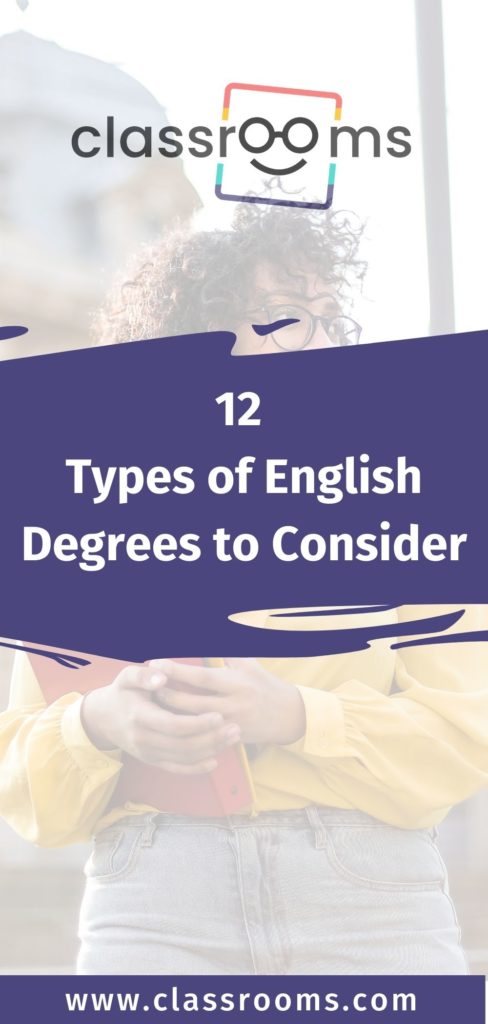
We are a reader-supported education publication. When you buy through links on our site, we may earn an affiliate commission to help us keep providing content.
Many college students struggle when they try to decide on their degree. It guides your course options and prepares you for a career, so you should feel confident when making that decision. Anyone interested in being an English major might be surprised by how many subjects there are to study. It could complicate the decision process and make it more challenging.
Before you get overwhelmed, read about these 12 types of English degrees. They approach different subject matters and present specialized career options. What you choose will depend on each degree’s context and how you can use it later in life.
1. Contemporary World Literature
People study books from centuries past, but Contemporary World Literature students will focus on texts printed after the start of the 20th century. Depending on which courses exist at your university, you could cover works from the postmodern, modernism, and magical realism trends in addition to contemporary books.
This degree is the best choice if you want to dive into literature from other countries and cultures. You’ll analyze different writing styles and thematic elements to learn more about the human experience in a broader context.
2. Advanced Composition
Most universities require first-year students to take an introductory class to essay writing. Afterward, you can choose to start an Advanced Composition track within your English degree education. These courses will fine-tune your advanced writing skills, which is useful if you plan to go to grad school or earn a Ph.D. You’ll then have all the tools you need to publish educational papers and complete a thesis on whatever specialty you decide to study later.
You should note that Advanced Composition classes do require reading assignments, but they’re writing intensive. While you browse course options for the upcoming semester, schedule your classes carefully so you don’t sign up for a full-time schedule of impossible workloads.

3. English Renaissance Literature
English Renaissance Literature classes review texts printed within the Renaissance period, which lasted from 1550-1660 or until King Charles II took the throne. They use a modern perspective to better understand canonical and non-canonical authors, such as Shakespeare and Julian of Norwich. You can read books focused on gender, race, and culture politics before discussing their relativity and intertextuality.
4. History of American Literature
Many standard English classes focus on British literature, but you can take a deep dive into classic and lesser-known American works with a History of American Literature degree. Discover how authors translated the ongoing events in America’s history through fiction or nonfiction. Dive into the traditional criticism of the narratives and compare it to modern literary movements to watch the genre grow through the past two-and-a-half centuries.
5. English Romanticism
When you study English Romanticism literature, you’ll read works from the 18th through the mid-19th centuries. William Godwin and Jean Jacques Rousseau will demonstrate the effects of the French Revolution on English literature before you dive into Romantic Period publications from some of the most prominent English poets of all time. These works still affect the world today and drive how authors portray relational complexities within the context of historical events.
6. History of English Novels
If you have a particular interest in English lit, a History of English Novels degree will cover an expansive selection of works. Instead of focusing on a single period or movement, you’ll read a select few from each. It’s an in-depth dive into books that influenced worldwide culture and understanding through notable English figures.

7. 20th Century Fiction
There are a few different paths of study for 20th Century Fiction students. You could focus your education on a particular culture within that time frame, like American books or African novels. You might also study literary movements during the 20th century or books printed for a specific age group. It depends on what’s offered at your university.
8. Study of Linguistics
Linguistics majors dive into the meat of literature — the makeup and use of human language. You’ll learn the history of phonetics, morphology, and semantics before applying those lessons to your reading. It changes how you understand communication, both in written and spoken forms.
If it sounds like a less-useful degree, you’d be wrong. Learning the history and structure of language sets you up for successful careers in translation, forensic linguistics, and even teaching. Everyone needs help communicating, which is what linguistics prepares you to do.
9. Literatures and Cultures
Literatures and Cultures degrees cover a broad range of texts from worldwide cultures. Instead of analyzing character arcs and themes, you’ll study the cultural significance and lessons within each novel. You might even examine nonfiction if that specialization exists at your university.
Students in this English degree field might get unique opportunities to study abroad. You can learn about different cultures through their literature in the country of origin. Talk with an advisor about what’s available and choose your destination wisely to travel the world without interrupting your studies.
10. Young Adult Literature
Some English students focus on Young Adult Literature. It’s a thriving genre that influences each generation and it’s also seen massive changes over recent years. You can read the latest books and discuss modern themes that encourage reading skills in young people.
Depending on your future career, you can use this type of English education to diversify the young adult genre and support the LGBTQIA+ community or open doors for authors of color in a book industry that’s still struggling to catch up with accurate representation.
11. Professional Writing
There are many different kinds of writing, but Professional Writing is a broad skill you can learn within your English degree studies. You’ll study a theoretical analysis of writing styles and hone your skills with coordinating, managing, and presenting written works in practical forms.
These classes will make you a competitive candidate for institutional or corporate positions after graduation. They give you a chance to explore fields like STEM writing, business writing, or public relations. There are so many career options when you prepare your writing skills for professional application.
12. Teacher Licensure Track
Some colleges have a Teacher Licensure Track within their English department. It’s what you should sign up for if you’d like to teach English at a high school or college level. While you read classics and debate literary motifs, you’ll approach each text with the lens of understanding it as a student but talking about it from an instructor’s perspective.
These classes could be prerequisites for on-campus educational departments and double as credit hours towards whatever education program you pursue in later years or grad school

Reflect on Your Interests
There are so many types of English degrees to consider, so reflect on your interests. You’ll know which degree is best for you once you decide which courses engage your passions and prepare you for your career.







